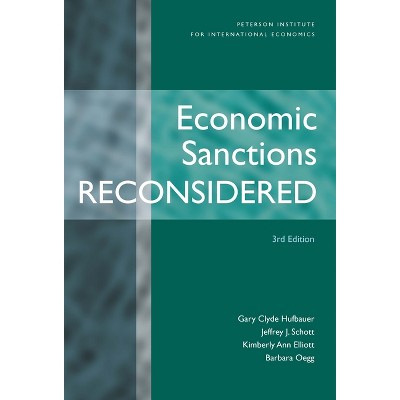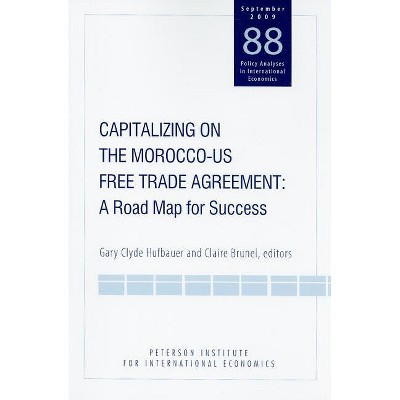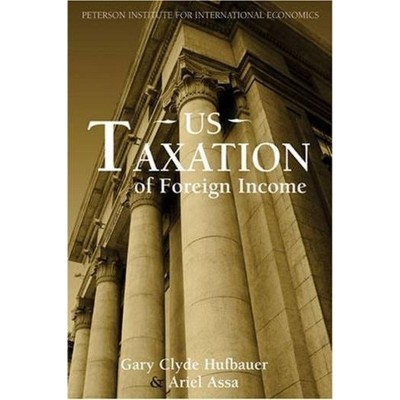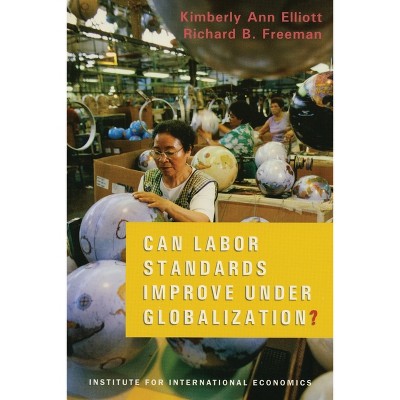Measuring the Costs of Protection in the United States - by Gary Clyde Hufbauer & Kimberly Ann Elliott (Paperback)

$15.95 when purchased online
Target Online store #3991
About this item
Highlights
- This comprehensive study finds that tariffs and quantitative import restrictions in place in 1990 cost American consumers about $70 billion, more than 1 percent of GDP.
- About the Author: Gary Clyde Hufbauer, Reginald Jones Senior Fellow since 1992, was formerly the Maurice Greenberg Chair and Director of Studies at the Council on Foreign Relations (1996-98), the Marcus Wallenberg Professor of International Finance Diplomacy at Georgetown University (1985-92), senior fellow at the Institute (1981-85), deputy director of the International Law Institute at Georgetown University (1979-81); deputy assistant secretary for international trade and investment policy of the US Treasury (1977-79); and director of the international tax staff at the Treasury (1974-76).
- 136 Pages
- Political Science, International Relations
Description
Book Synopsis
This comprehensive study finds that tariffs and quantitative import restrictions in place in 1990 cost American consumers about $70 billion, more than 1 percent of GDP. The net national welfare loss, after deducting tariff revenues and transfers to domestic producers, was $11 billion, of which perhaps 70 percent was captured by foreign producers as quota rents. Nearly half of the consumer costs are accounted for by 21 highly protected sectors, and more than a third, $24 billion, are attributable to textiles and apparel alone. The cost to consumers of "special" protection aside from textiles and apparel dropped sharply in the 1980s, from $15 billion in 1984 to $6 billion in 1990. If it is ratified, the Uruguay Round will result in a further large reduction in these costs, particularly in textiles and apparel. Still, the annual consumer costs per American job "saved" by "special" protection range from $100,000 to over $1 million and average $170,000. Consumers thus pay over six times the average annual compensation of manufacturing workers to preserve each job. In terms of net national welfare, the cost per protected job is about $54,000. This figure far exceeds the cost per worker of the most generous adjustment program entailing income support, retraining, and relocation. This study will be indispensable to public and private sector decision makers and analysts concerned about the very high costs and small benefits of US import barriers. Teachers will find this book an engrossing way to introduce students to the cost of protection calculations that government economists and trade negotiators frequently make.About the Author
Gary Clyde Hufbauer, Reginald Jones Senior Fellow since 1992, was formerly the Maurice Greenberg Chair and Director of Studies at the Council on Foreign Relations (1996-98), the Marcus Wallenberg Professor of International Finance Diplomacy at Georgetown University (1985-92), senior fellow at the Institute (1981-85), deputy director of the International Law Institute at Georgetown University (1979-81); deputy assistant secretary for international trade and investment policy of the US Treasury (1977-79); and director of the international tax staff at the Treasury (1974-76).
Kimberly Ann Elliott was a Research Associate at the Institute, and co-author of Economic Sanctions Reconsidered (second edition 1990), Auction Quotas and United States Trade Policy (1987), and Reciprocity and Retaliation in US Trade Policy.Dimensions (Overall): 9.0 Inches (H) x 6.03 Inches (W) x .39 Inches (D)
Weight: .5 Pounds
Suggested Age: 22 Years and Up
Number of Pages: 136
Genre: Political Science
Sub-Genre: International Relations
Publisher: Peterson Institute for International Economics
Theme: Trade & Tariffs
Format: Paperback
Author: Gary Clyde Hufbauer & Kimberly Ann Elliott
Language: English
Street Date: January 1, 1994
TCIN: 1005678445
UPC: 9780881321081
Item Number (DPCI): 247-07-1786
Origin: Made in the USA or Imported
Shipping details
Estimated ship dimensions: 0.39 inches length x 6.03 inches width x 9 inches height
Estimated ship weight: 0.5 pounds
We regret that this item cannot be shipped to PO Boxes.
This item cannot be shipped to the following locations: American Samoa (see also separate entry under AS), Guam (see also separate entry under GU), Northern Mariana Islands, Puerto Rico (see also separate entry under PR), United States Minor Outlying Islands, Virgin Islands, U.S., APO/FPO
Return details
This item can be returned to any Target store or Target.com.
This item must be returned within 90 days of the date it was purchased in store, shipped, delivered by a Shipt shopper, or made ready for pickup.
See the return policy for complete information.






![Economic Sanctions Reconsidered [With CD] - 3rd Edition by Gary Clyde Hufbauer & Jeffrey Schott & Kimberly Ann Elliott & Barbara Oegg](https://target.scene7.com/is/image/Target/GUEST_b68b81d3-d6c1-482a-8709-f82fed1ad102)




